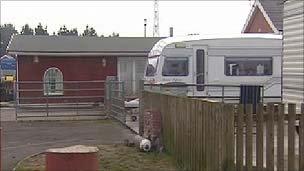Strategy offers 'new deal' with Gypsies and travellers
- Published

Wales will have the UK's first Gypsy and traveller strategy, say ministers
The Welsh Government has called for a "new deal" between Gypsy travellers and the rest of society.
It published a strategy that ministers said would help tackle stereotypes and improve relations.
The document contains guidelines for public services on better accommodation, health and education for Gypsies and travellers.
It estimates there are about 4,000 Gypsy travellers living in Wales.
The document - called Travelling to a Better Future and hailed as the first of its kind in the UK - says there is "an opportunity for a new deal for the Gypsy and traveller community".
"This is an opportunity to sketch out a new relationship between Gypsies and travellers and the settled community," it says.
"For too long the relationship between the two has been antagonistic, based on suspicion, confrontation and a lack of understanding from both perspectives."
It says the Welsh Government recognised a need for "substantial changes" in attitudes towards Gypsies, who are not properly understood and suffer from a high level of exclusion.
Launching it on Thursday, Equalities Minister Jane Hutt said it would help tackle stereotypes of Gypsies and travellers, and tried to make sure their voice is heard.
She said Gypsy and traveller culture was part of Wales's "rich mix of cultures and traditions".
But Kate Bennett, national director of the Equality and Human Rights Commission in Wales, said: "What Gypsy travellers told us in our research was they felt misunderstood and that public services did not cater for them.
"If we can improve their access to health, education and employment, that would help with a huge issue.
"If you lead more Gyspy travellers into contact with the vast majority of the population, that will help with integration."
'Shortage'
Statistics published by the Welsh Government, external on Wednesday said there were 793 caravans on 78 sites in 21 of Wales' 22 councils. About 15% were on unauthorised sites.
Bethan Wyn Jones, a Gypsy and traveller liaison officer for Gwynedd Council, said a shortage of permanent and transit sites made unauthorised camping "inevitable".
Rose lived on caravan sites for over 30 years but has now moved into a house in Flintshire.
She said: "The community of Gypsies and travellers in Wales has grown significantly in recent years, whereas the provision of sites to meet the accommodation needs of those communities has not developed in line with the population growth.
"I understand there are issues in terms of nimby-ism, but I think that we also need to address the fact that some unauthorised camping will inevitably continue while there is a shortage of permanent and transit sites available for travelling communities in Wales."
She said many travellers had settled, initially to ensure health and education for their children.
"In our modern society, I don't believe there's any need for anybody to be forced to be camping without authority on any patch of ground," she added.
"Everyone is entitled to somewhere to live."
Travellers have been in the spotlight recently because of the attempted eviction of hundreds of people from a site at Dale Farm in Basildon, Essex, following a 10-year legal and planning dispute.
Reverend Aled Edwards, chair of the Wales Strategic Migration Partnership, called for a greater understanding between different social groups, particularly in light of recent events at Dale Farm.
'Misunderstood'
He said: "There are issues of stereotyping and reactions to this community who experience a degree of discrimination, sometimes antagonism, sometimes violence.
"We have to see what is in the document being published today, but I think it's a good step forward, particularly when you look over the border at other parts of the UK where they haven't been quite as pioneering in developing such schemes.
"It's better that we have a strategy like this where the government talks to a lot of key partners like ourselves to manage the situation, reflect on it and get people to have a conversation with each other, so the sort of community tension that we found at Dale Farm isn't replicated here."
The Welsh Government announced £2m to fund work to improve sites earlier this year. In total, 25 grants have been awarded over four years to 11 local authorities
- Published15 November 2010